大学英语精读2UNIT1PPT
大学英语精读第二册unit 1课件

VOA BBC
English corner
writing
Before Reading
Global Reading
Detailed Reading
After Reading
Blank-filling Directions: Listen to the passage and fill in the blanks. English As an International Language existing International languages include both _______ languages that have become __________________ international means of communication and languages artificially constructed to serve widespread this purpose. The most famous and __________ artificial international language is Esperanto; however, the most widespread international language is not artificial. _______ official Today, English is used in more countries as an language or as the main means _________ over 1.4 Worldwide of international communication than any other language. status billion people live in countries where English has official _____ . One out of five of the present world’s population speaks some English. And at _______ one in five is learning mail English. About ____ of the world’s _____ is written in English. And 90% of all 85% retrieval information in the world’s electronic _______ systems is stored in English.
大学英语精读2 第一单元PPT

• Group D: Work out 5 questions for the President, Registrar, and senior student respectively.
experiences at the university and gives advice to the freshman. – The freshman asks questions and the others answer.
Warming up Questions / Activities
Another School Year
Unit 1
Questions / Activities Check-on Preview Objectives
Warming up
Warming up Questions / Activities
• Do you remember the orientation sessions you had when you first came to university? Let’s do something similar. Divide into four groups:
• Fire on!
Warming up Questions / Activities
Sum Up
• What do you go to college for? • How has your first semester in university
changed you? • Do you now have new visions of the purpose
大学英语精读二unit课件
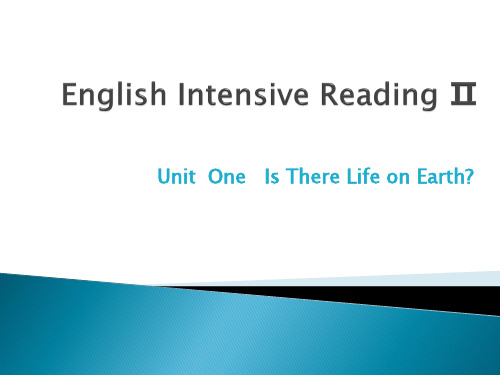
1本周,金星上有一件非常值得兴奋的事件。科 学家们首次将一颗人造卫星成功登陆地球,目前已 发回信号和照片。
金融商业中心,华尔街
百老汇,帝国大厦,纽 约时代广场,大都会艺 术博物馆
哥伦比亚大学,曼哈顿 音乐学院
New words and phrases
There was great excitement…
excitement : an exciting thing 令人兴奋的事情 exciting a. 令人兴奋的 (事情) exited a. 兴奋的(人) e.g.
Unit One Is There Life on Earth?
Art Buchwald(1925-2007), was an American humorist, known for his column(专栏)
in The Washington Post.
His column focused on political satire(讽刺) and commentary.
conclude v. 总结,结束,使…终止 e.g. He concluded by wishing everyone a safe trip. 他在结束时祝愿大家一路平安。 The performance concluded with a dance. 这场演出以一支舞蹈结束。
…composed of solid concrete and … solid a. 坚硬的,结实的,坚实的,可靠的 solid foundation 坚实的基础 solid evidence 可靠的证据
大学英语精读2 Unit 1
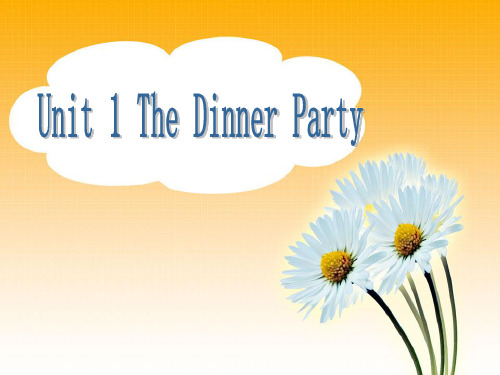
Did the hunter manage to ~the wounded deer?
Part two
Question for thinking
1. What was the subject of discussion between the young girl and the major? 2.What is their point of view respectively?
naked
bare feet
bald
3.Word formation
1)-al:can be added to nouns to form adj. with the meaning “of”, e.g. colonial=of a colony natural=of nature 2)-ous:can also be added to nouns to form adj. with the meaning “having much”, “full of”, e.g. spacious=having much space joyous=full of joy; causing joy
She has outgrown her passion for music.
7. jumping-on-a-chair-at-the-sight-of-a-mouse
This is a compound adjective formed from an attributive clause (the era) when they would jump on a chair at the sight of a mouse
中国铁娘子。
张海迪 (a famous writer)
现代大学英语精读第二版book2unit1分析解析精选课件

a child of Italian immigrants Began his career teaching English at the University of
Kansas City Joined the US Air Force in 1942, served as a gunner in
AnAotnhoethr eSrcShcohooloYl eYeaarr–iardi John Ciardi
坚持
Another School Year
Unit 1
Warming up
B ackground T ext Analysis R einforcement
坚持
Warming up Objectives
• Understand the occasion and stylistic features of the speech
• Think about the question of the purpose of university education
literary endeavors.
坚持
Background
His Influence
Poet, translator, etymologist Major works:
现代大学英语精读2 lesson1 (课件) - 副本
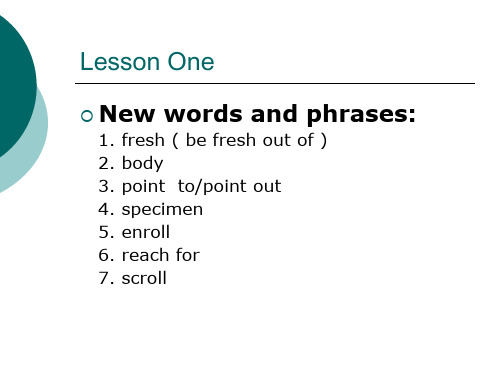
24. have no business 25. species 26. civilized 27. add to (add sth. to sth. / add up to) 28. literal (in literal time) 29. contain(Cf. hold/consist/ compose ) 30. humanity 31. in essence
of
2. (Vt.) make sb. a member
eg:Universities will enrol new students this spring.
6. reach for: to try to obtain sth.
eg: what are the goals in life to reach for ?
Lesson One
New words and phrases:
1. fresh ( be fresh out of ) 2. body 3. point to/point out 4. specimen 5. enroll 6. reach for 7. scroll
Lesson One
8. certify 9. specialize 10. expose 11. generate 12. matter 13. average 14. hold 15. be employed in doing sth.
eg: Scientists assume that there is no animal life on Mars.
Assuming it rains tomorrow, what shall we do?
2)to pretend to have, to begin to have=put on装出(…样子),显出
现代大学英语精读第二版Unit ppt课件

7. 大学教育应该设法保证我们的大学生有 进行批判性思维的能力。
College education should see to it that our
3.让我们同意对方可以有不同意见吧。我们 起码在一点上意见是一致的,我们同意不采 取暴力,我们同意我们的分歧必须和平解决。
Let’s agree to disagree.
We at least agree on one thing: We agree not to use force. We agree that we must settle
WB TR
The Green Banana
Theme
Structure
Detailed Analysis
Unit 6
Text Analysis
WB TR
Text Analysis
Theme
• We should respect all civilizations in the world. Wisdoms are to be discovered with an open mind to other cultures.
➢ Limited life experience:
People will never be able to experience every life situation of everyone around the world, so assumptions about life have to be based on existing limited experience. It is normal to assume things and interpret new experience and others’ behavior on the basis of one’s own experience.
大学英语精读第二册课件Unit1
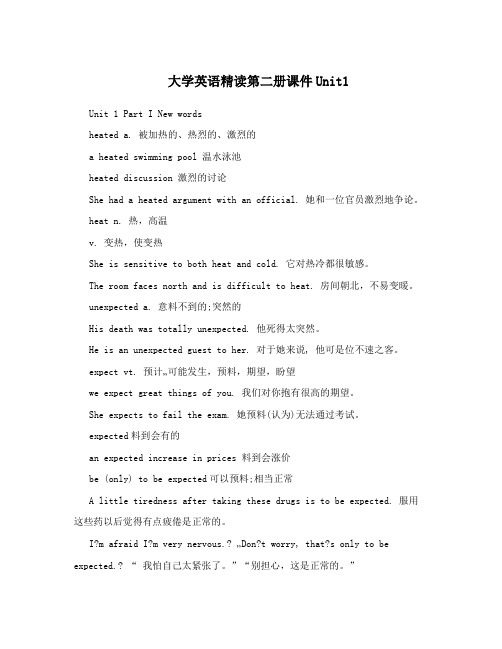
大学英语精读第二册课件Unit1 Unit 1 Part I New wordsheated a. 被加热的、热烈的、激烈的a heated swimming pool 温水泳池heated discussion 激烈的讨论She had a heated argument with an official. 她和一位官员激烈地争论。
heat n. 热,高温v. 变热,使变热She is sensitive to both heat and cold. 它对热冷都很敏感。
The room faces north and is difficult to heat. 房间朝北,不易变暖。
unexpected a. 意料不到的;突然的His death was totally unexpected. 他死得太突然。
He is an unexpected guest to her. 对于她来说, 他可是位不速之客。
expect vt. 预计…可能发生,预料,期望,盼望we expect great things of you. 我们对你抱有很高的期望。
She expects to fail the exam. 她预料(认为)无法通过考试。
expected料到会有的an expected increase in prices 料到会涨价be (only) to be expected可以预料;相当正常A little tiredness after taking these drugs is to be expected. 服用这些药以后觉得有点疲倦是正常的。
I?m afraid I?m very nervous.? …Don?t worry, that?s only to be expected.? “ 我怕自己太紧张了。
”“别担心,这是正常的。
”naturalist n. 博物学家;博物学研究者;自然主义者 nature, naturalshortly ad. 立刻,马上;不久The flight was hijacked shortly after takeoff (it took off). 飞机在起飞不久遭到劫持。
创新大学英语第二册Unit 1.reading ppt
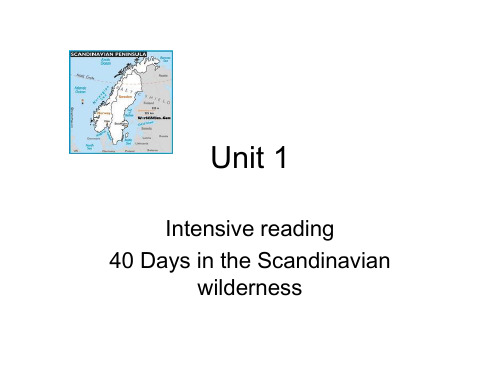
Detailed study of the text
1. whether…or…无论…还是…
You have to take the medicine, whether you like it or not.
Detailed study of the text
2. Be inclined to = be likely to 有可能; 有… 的可能性
Detailed study of the text
(Para5) One the one hand, I missed my family and was not sure whether I could succeed in reaching the destination; on the other hand, I was ready to prove to myself and my family members that I had the right qualities to finish the solo trip.
Background information
Appalachian trail is a 2174 mile (3478 km) marked hiking and camping trail in the eastern United States, extending between Springer Mountain in Georgia and Mount Katahdin in Maine.阿巴拉契亚山脉位于美 国东部,是北美洲东部的一座山系。南起 美国的阿拉巴马州,北至加拿大的纽芬兰 和拉布拉多省,全长约2600公里.
一方面,我思家心切,怀疑自己是否真能完成这次 旅行;另一方面,我急不可的要向自己和国内 的家人证明,我具备所需的一切实力。
大学英语精读Unit 2 学校课件

8. What title is added to his name when a man
becomes a knight?
9. How many miles did the second half of the
voyage cover?
Questions about Part 3
1. What do you think Chichester learnt from his voyage? 2. Why do we think what Chichester did has given people all over the world new pride?
Part Division of the Text
Part 1
Lines 1 — 11
Main Idea
Chichester’s decision to sail round the world single-handed
Chichester’s accomplishment of his great voyage
College Eng Round the World
北华大学 公共外语教育学院 张凤敏
The Main Tasks
Part 1 Part 2 Part 3
Part 4
Warm-up Questions
Text Study
Language Points
Difficult Sentences: 1. Line 5:
Translation:
奇切斯特在首届横渡大西洋单人航海比赛中夺魁时,已经58岁了。
2. Line 15-16
1.) What is the grammatical function of “anyone had previously sailed alone” in the sentence? 2)Tanslation:
现代大学英语精读第二版2第一课讲解.pdf

• the student body: all the students of the university
• body: a group of people who work or act together, often for an official purpose, or who are connected in some other way, e. g.
Sentence Paraphrase
• The word "beanpole“ means "a tall thin person",Here the writer deliberately evokes a "bean pole”, a pole farmers use as a support in growing beans.
III. Sentence Paraphrase
Text Analysis
Theme
The author tries to clarify the purpose of a university: to put the students in touch with the best civilization that human race has created.
… I had just completed my graduate studies and began teaching at the University of Kansas City.
Sentence Paraphrase
• Part of the student body was a beanpole with hair on top who came into my class, sat down, folded his arms, and looked at me as if to say "All right, teach me something.” (Para.1)
大学英语精读第三版 第二册unit 1 the dinner party
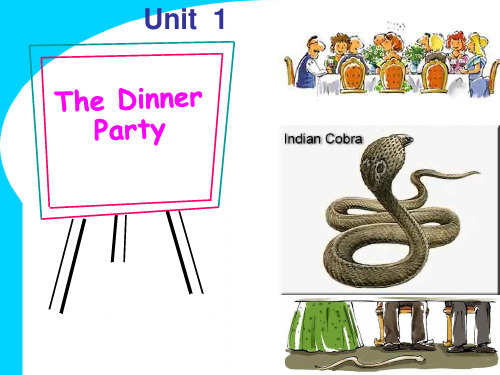
Some Remarks about Women
Frailty, thy name is woman!
——William Shakespeare
女人,你的名字叫脆弱。
Of all people, servants and women are the most difficult to behave to. ——Confucius 唯小人与女子难养也。
Information related to the text 1. Author 2. Cobra 3. Some remarks about women
4. India
Information related to the text
1. About the Author and the Story
The king cobra, the largest of all poisonous snakes, may reach a length of 18 ft (5.5 m) and feeds chiefly on other snakes.
• The Indian cobra is usually 4-5 ft (1.2–1.6 m) long.
„The Dinner Party‟ by Mona Gardner, an American woman writer, is selected from The Saturday Review of Literature, 1941.
Mona Gardner, an American woman writer. Most of her short stories were written for the Saturday Evening Post magazine
现代大学英语精读2完整lesson1PPT课件
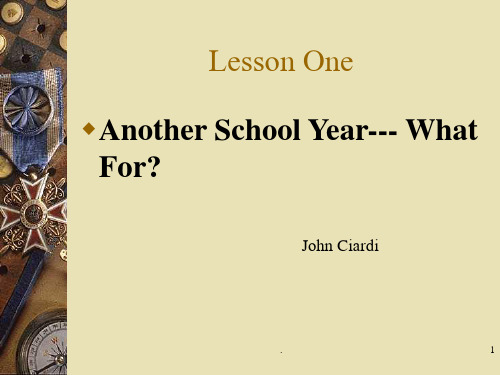
Chaucer
La Rochefoucauld
Greek English
The Divine Comedy
Hamlet
.
6
Name
Nationality
Masterpiece
William Shakespeare
Alighier Dante
Italian German源自Relativity Maxims
.
9
Pre-class Questions
2) Why did the writer do some calculation? 3) Do you think the student was convinced? 4. What is the writer’s view on the purpose of a university? (theme)
Paraphrasing: Our colleges inevitably produce such people who can operate machines but who cannot think. We cannot help that. But we can’t say that these people have received a proper college education. It is more accurate to say that these college years have just passed them by without leaving anything on them.
appreciation
.
4
Background Information
Do you know anything about the famous historic literary figures below? Match the related information.
精读2 Unit 1

b e c o m e s w h e n t h e f a c u l ty l o s e s interest in students.”
The end of Author.
Orientation speech
Genre
period of time at the beginning of the academic year at a university during which a variety of events are held to orient and welcome new students. The orientation helps new students to organize their classes, acclimate to student life, and introduce themselves to other new students. Speeches are often given at orientation by presidents or acclaimed professors of the university.
or History, to less familiar ones such as
Philosophy, and a host of work-related (vocational) courses such as accountancy.
The end of Questions and Answers.
species
Examples:
Some species of animals have become extinct because
现代大学英语精读2第二版Unit1_Another_School_Year_Language_study

I. Word Study
4. expose
v. a. to subject or allow to be subjected to an action or an influence 使受影响
b. to subject (a photographic film, for
example) to the action of light 使曝光 c. to make known (sth. discreditable); to reveal (the guilt or wrongdoing of) 揭发(有损信誉的事);揭露(罪恶或错误的行为)
Word formation n. enrollment
Example: We enrolled in the army.
W
B
T
L
E
Lesson 1 Another School Year—What For?
II. Phrases and Expressions
2. specialize in
to concentrate on a particular activity or product 从事专门活动或销售专业产品
W
B
T
L
E
Lesson 1 Another School Year—What For?
I. Word Study
6. generate
Word formation
v. to produce as a result of a chemical or physical process Examples: a generating station 发电厂,发电站 When coal burns, it generates heat. generative reproduction 有性繁殖
大学英语精读2 Unit 1
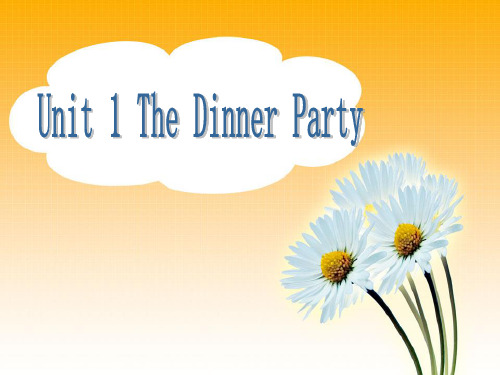
张海迪 (a famous writer) 用爱心和坚强铸就中国魂。
普拉蒂巴·帕蒂尔 (Pratibha Patil)
•Part division • Part one( 1 ) : Introduction • Part two( 2 - 4 ) : The beginning
Discussion about how women would react to a crisis.
New Delhi
Modern history of India
In 1772 Britain named its first Governor General to India and formally began to rule the country as a British colony. Until 1947 when the Indian people,
Keys to spot dictation
1.do the cooking 2. hardly thought so 3. settled down
4. half expected 5. equipment
under Gandhi’s leadership,
won their struggle for
independence and British
rule in Indian ended.
Questions for discussion:
Frailty, thy name is woman. -- William Shakespeare
a machine that is not so easy to operate
stick-in-the-mud people
大学英语精读第二册unit1

1. bare2. empty3. empty4. bare5. empty6.empty二)1. shortly2.track down3.faint4.motioned5.at the sight of6.feel like7.slamming8.rang out9.contract10.made for11.heated12.emerged三)1. host2. sprang up/rang out3. impulse4. came to5. track down6. unexpected7. outgrow8. widened9. shortly10. emerge / spring up11. at the sight of12. made for13. crisis14. colonial四)1. Jimmy has outgrown the shirts his aunt made for him a few years ago.2. Does the doctor think the elderly lady is likely to survive the operation / it is likely that the elderly lady will survive the operation?3. The other day your cousin paid us an unexpected visit.4. Don't you see the nurse motioning us to be silent?5. Her face lit up with joy at his return.6. The sound of her footsteps grew fainter as she walked farther away.五)Additional advantageousAnxious conditionalCourageous curiousDangerous educationalEmotional famousIndustrial intentionalMedical mountionousMusical mysteriousNational occasionalPersonal practical2.Heated coloredpigtailed giftedbearded pointedexperienced agedskilled diseased六)1.The people questioned gave very different opinions on the issue.2. Can you see the man climbing on that rock?3. Several days passed before they came up with a satisfactory solution to the problems discussed.4. We were woken early by the sound of the birds singing.5. The chairman made it clear that those objecting should explain their reasons.6. After a day’s work, I felt I had little energy left.7. I knew of some of the athletes taking part.8. The success obtained surprised those who had given up the project as impossible. 七)1. During the time that2. As long as3. Although4. as long as5. whereas6. Although7. whereas8. Although1. They frightened the child into telling the truth.2. He tricked her into marrying him by pretending that he was the son of a millionaire.3. My tactless words forced the old gentleman into buying something he could not possibly afford.4. He finally talked me into accepting his terms.5. The girl persuaded her father into giving up smoking.6. Their severe criticism shocked her into realizing her selfishness.1. Guests are to be back in the hotel by twelve o’clock.2. An investigation is to be made next week.3. I am to meet them at the airport.4. You are to finish your homework before you watch TV.5. The medicine is to be taken three times a day after meals.6. Bob and Susan are to get married in October八)1.hosts2.heated3.argument4.impluse5.shortly6.emerged7.slam8.crawled9.crisis1.corner2.attention3.noticed4.shining5.directed6.there7.bed8.snake9.its10.feet11.from12.however13.do14.as15.forward16.neither17.still18.if19.through20.floor21.pulling22.under23.cried24.out25.to26.where27.made28.eyes九)1.do the cooking3.hardly thought so3.settled down4.half expected5.equipment6.boiled over7.why things were so quiet8.burning9.greeted10.battlefield十)1.她砰地关上门,一声不吭地走了,他们之间那场争执就此结束。
- 1、下载文档前请自行甄别文档内容的完整性,平台不提供额外的编辑、内容补充、找答案等附加服务。
- 2、"仅部分预览"的文档,不可在线预览部分如存在完整性等问题,可反馈申请退款(可完整预览的文档不适用该条件!)。
- 3、如文档侵犯您的权益,请联系客服反馈,我们会尽快为您处理(人工客服工作时间:9:00-18:30)。
No late for or absence from class Actively involved in our class Finish our assignments on time Listen more, speak more, read more and
write more to improve your English
ቤተ መጻሕፍቲ ባይዱ
Women have been prejudiced against for centuries perhaps ever since life on earth. They have long been referred to as “weaker sex” or “fairer sex,” considered naturally weaker than men, squeamish, unable to perform the work that requires muscles or pluck the courage to face up to any crisis. As we know, Plato, Aristotle, Shakespeare, and Confucius all made negative remarks about women. And even today, such a prejudice has not been eliminated and the argument in the text shows how hard long-standing prejudices die.
Introductory Questions
1. Where and when did the story take place? 2. Who gave the dinner party and what guests were invited to it? 3. What was the subject of the discussion between the young girl and the major? 4. What did the American naturalist do when they were having this discussion? What kind of expression did he see come over the hostess’s face? 5. What was it that the naturalist cane to realize when he saw the native boy place a bowl of milk on the veranda? 6. Did he jump back and warn the others? What did he do instead, then? 7. What happened before he finished the counting? 8. How did the hostess know that the cobra was in the room?
Cobras
Cobras, found in some parts of Africa and Asia, are poisonous snakes. Most cobras bite their victims and their bite may cause death within a few hours. Spitting cobras of Africa spit poison which causes blindness if it gets in the eyes. A fullgrown Indian cobra is nearly six feet long and about five inches around. On the back of its hood it has a mark like a pair of spectacles. That’s why it is sometimes called the “spectacled snake” or “spectacled cobra”. Cobras usually eat small animals, such as frogs, fish and birds.
Welcome back to our class!
Happy Chinese new year
May this tiger year brings you wisdom, extreme health, overwhelming love!
Tips for the new semester:
1. 2. 3. 4.
Message of the story:
Despite men’s long-standing prejudice, women have great courage and presence of mind to face extremely dangerous situations.
Prejudice against women
cobras
